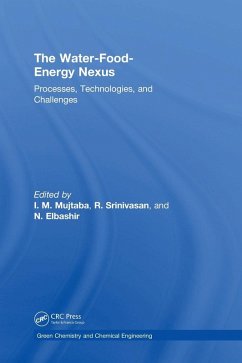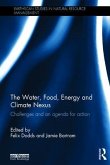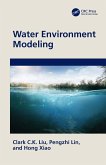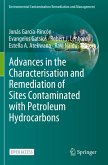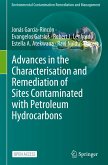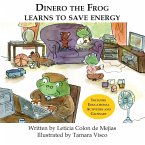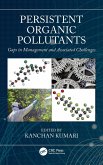The Water-Food-Energy Nexus
Processes, Technologies, and Challenges
Herausgeber: Mujtaba, I. M.; Elbashir, N. O.; Srinivasan, R.
The Water-Food-Energy Nexus
Processes, Technologies, and Challenges
Herausgeber: Mujtaba, I. M.; Elbashir, N. O.; Srinivasan, R.
- Gebundenes Buch
- Merkliste
- Auf die Merkliste
- Bewerten Bewerten
- Teilen
- Produkt teilen
- Produkterinnerung
- Produkterinnerung
The book highlights the interplay among water, food, energy, and the future of sustainability. It discusses challenges in efficient water and energy production and management, wastewater treatment, and impact upon food and essential commodities. It includes a case study evaluating sustainability of process, supply chain, and enterprise.
Andere Kunden interessierten sich auch für
![The Water, Food, Energy and Climate Nexus The Water, Food, Energy and Climate Nexus]() The Water, Food, Energy and Climate Nexus203,99 €
The Water, Food, Energy and Climate Nexus203,99 €![The Survival Nexus The Survival Nexus]() Charles WeissThe Survival Nexus56,99 €
Charles WeissThe Survival Nexus56,99 €![Water Environment Modeling Water Environment Modeling]() Clark C. K. LiuWater Environment Modeling73,99 €
Clark C. K. LiuWater Environment Modeling73,99 €![Advances in the Characterisation and Remediation of Sites Contaminated with Petroleum Hydrocarbons Advances in the Characterisation and Remediation of Sites Contaminated with Petroleum Hydrocarbons]() Advances in the Characterisation and Remediation of Sites Contaminated with Petroleum Hydrocarbons30,99 €
Advances in the Characterisation and Remediation of Sites Contaminated with Petroleum Hydrocarbons30,99 €![Advances in the Characterisation and Remediation of Sites Contaminated with Petroleum Hydrocarbons Advances in the Characterisation and Remediation of Sites Contaminated with Petroleum Hydrocarbons]() Advances in the Characterisation and Remediation of Sites Contaminated with Petroleum Hydrocarbons37,99 €
Advances in the Characterisation and Remediation of Sites Contaminated with Petroleum Hydrocarbons37,99 €![Dinero the Frog Learns to Save Energy Dinero the Frog Learns to Save Energy]() Leticia Colon De MejiasDinero the Frog Learns to Save Energy12,99 €
Leticia Colon De MejiasDinero the Frog Learns to Save Energy12,99 €![Persistent Organic Pollutants Persistent Organic Pollutants]() Persistent Organic Pollutants222,99 €
Persistent Organic Pollutants222,99 €-
-
-
The book highlights the interplay among water, food, energy, and the future of sustainability. It discusses challenges in efficient water and energy production and management, wastewater treatment, and impact upon food and essential commodities. It includes a case study evaluating sustainability of process, supply chain, and enterprise.
Hinweis: Dieser Artikel kann nur an eine deutsche Lieferadresse ausgeliefert werden.
Hinweis: Dieser Artikel kann nur an eine deutsche Lieferadresse ausgeliefert werden.
Produktdetails
- Produktdetails
- Verlag: CRC Press
- Seitenzahl: 794
- Erscheinungstermin: 12. September 2017
- Englisch
- Abmessung: 260mm x 183mm x 47mm
- Gewicht: 1660g
- ISBN-13: 9781498760836
- ISBN-10: 149876083X
- Artikelnr.: 54588842
- Herstellerkennzeichnung
- Books on Demand GmbH
- In de Tarpen 42
- 22848 Norderstedt
- info@bod.de
- 040 53433511
- Verlag: CRC Press
- Seitenzahl: 794
- Erscheinungstermin: 12. September 2017
- Englisch
- Abmessung: 260mm x 183mm x 47mm
- Gewicht: 1660g
- ISBN-13: 9781498760836
- ISBN-10: 149876083X
- Artikelnr.: 54588842
- Herstellerkennzeichnung
- Books on Demand GmbH
- In de Tarpen 42
- 22848 Norderstedt
- info@bod.de
- 040 53433511
Iqbal M. Mujtaba is a Professor of Computational Process Engineering and currently the Head of School of Engineering at the University of Bradford. He obtained his BSc Eng and MSc Eng degrees in Chemical Engineering from Bangladesh University of Engineering & Technology (BUET) in 1983 and 1984 respectively and obtained his PhD from Imperial College London in 1989. He is a Fellow of the IChemE, a Chartered Chemical Engineer, and the current Chair of the IChemE's Computer Aided Process Engineering Subject Group. He was the Chair of the European Committee for Computers in Chemical Engineering Education from 2010-2013. Rajagopalan Srinivasan is a Professor of Chemical Engineering and Institute Chair at Indian Institute of Technology Gandhinagar. Previously, he was with the National University of Singapore and AStar's Institute of Chemical & Engineering Sciences. Raj received his B.Tech from Indian Institute of Technology Madras in 1993 and PhD from Purdue University in 1998, both in Chemical Engineering. He was a research associate in Honeywell Technology Center, Minneapolis, before joining NUS. Nimir Elbashir holds a joint appointment as a Professor in the Chemical Engineering Program and the Petroleum Engineering Program at Texas A&M University at Qatar and he is the Director of Texas A&M's Gas and Fuels Research Center; a major research center that involves 27 faculty members from both the Qatar and College Station campuses of Texas A&M University (http://gfrc.tamu.edu/). He has extensive research and teaching experience from four different countries around the world, including his previous position as researcher at BASF R&D Catalysts Center in Iselin, New Jersey.
Section I: Water 1. Desalination 1.1 Model-Based Techniques in Desalination
Processes: A Review 1.2 Addressing the Global Water-Energy Challenge
through Energy-Efficient Desalination 1.3 Forward Osmosis for Irrigation
Water Supply Using Hybrid Membrane System for Draw Solution Regeneration 2.
Water Management 2.1 Toward Sustainable Water Management in Industrial
Cities 2.2 Optimal Water Network Synthesis [Munawar A. Shaik] 2.3
Rationalization of Water Quality Monitoring Network 3. Wastewater Treatment
3.1 Appropriate Interventions and Technologies for Providing Safe Drinking
Water to Rural and Underprivileged Communities 3.2 Toward the Synthesis of
Wastewater Recovery Facilities Using Enviroeconomic Optimization 3.3 Water
Conservation, Reuse, and Challenges: A Case Study Performed at Amul Dairy
3.4 Occurrence, Effects, and Treatment of Endocrine-Disrupting Chemicals in
Water Section II: Food 4. Advances in Cereal Processing: An Approach for
Energy and Water Conservation 5. Clean Energy Technologies for Sustainable
Food Security 6. Bioenergy and Food Production: Appropriate Allocation for
Future Development 7. Uses of Water and Energy in Food Processing 8. A
General Model for Food Cooking Undergoing Phase Changes Section III: Energy
9. Fossil Fuel 9.1 Energy Efficient Thermal Retrofit Options for Crude Oil
Transport in Pipelines 9.2 Process Industry Economics of Crude Oil and
Petroleum Derivatives for Scheduling, Planning, and Feasibility Studies 10.
Bio Fuel 10.1 Environmentally Benign Biodiesel Production from Renewable
Sources 10.2 Process for Synthesis of Biodiesel from Used Cooking Oil:
Feasibility and Experimental Studies 11. Synthetic Fuel and Renewable
Energy 11.1 Gas-to-liquid (GTL)-Derived Synthetic Fuels: Role of Additives
in GTL-Derived Diesel Fuels 11.2 The Role of Alternative Aviation Fuels on
Reducing the Carbon Footprint 11.3 Integration of Distributed Renewable
Energy Generation with Customer-End Energy Management System for Effective
Smart Distribution Grid Operation 11.4 Evaluation and Modeling of Demand
and Generation at Distribution Level for Smart Grid Implementation 11.5 A
Process to Model Fischer-Tropsch Reactors 12. Carbon Capture 12.1
Application of Rotating Packed Bed Technology for Intensified
Postcombustion CO2 Capture Based on Chemical Absorption 12.2 Process
Simulation and Integration of Natural Gas Combined Cycle (NGCC) Power Plant
Integrated with Chemical Absorption Carbon Capture and Compression 12.3
Postcombustion CO2 Capture Based on Chemical Absorption in Power Plants
12.4 Operation of Supercritical Coal-Fired Power Plant (SCPP) Integrated
with CO2 Capture under the UK Grid Code 12.5 Whole System Experimental and
Theoretical Modeling Investigation of the Optimal CO2 Stream Composition in
the Carbon Capture and Sequestration Chain 12.6 Performance of Porous
Covalent Organic Polymers for CO2 Capture at Elevated Pressure 12.7
Postcombustion Carbon Capture Using Polymeric Membrane Section IV:
Sustainable Future 13. The Role of Molecular Thermodynamics in Developing
Industrial Processes and Novel Products That Meet the Needs for a
Sustainable Future 14. Green Engineering in Process Systems: Case Study of
Chloromethanes Manufacturing 15. Fundamental Aspect of Photoelectrochemical
Water Splitting 16. Photoelectrochemical Approaches to Solar-H2 Generation
17. Design and Operating Strategy Innovations for Energy-Efficient Process
Operation 18. Evaluating Sustainability of Process, Supply Chain, and
Enterprise: A Bio-Based Industry Case Study
Processes: A Review 1.2 Addressing the Global Water-Energy Challenge
through Energy-Efficient Desalination 1.3 Forward Osmosis for Irrigation
Water Supply Using Hybrid Membrane System for Draw Solution Regeneration 2.
Water Management 2.1 Toward Sustainable Water Management in Industrial
Cities 2.2 Optimal Water Network Synthesis [Munawar A. Shaik] 2.3
Rationalization of Water Quality Monitoring Network 3. Wastewater Treatment
3.1 Appropriate Interventions and Technologies for Providing Safe Drinking
Water to Rural and Underprivileged Communities 3.2 Toward the Synthesis of
Wastewater Recovery Facilities Using Enviroeconomic Optimization 3.3 Water
Conservation, Reuse, and Challenges: A Case Study Performed at Amul Dairy
3.4 Occurrence, Effects, and Treatment of Endocrine-Disrupting Chemicals in
Water Section II: Food 4. Advances in Cereal Processing: An Approach for
Energy and Water Conservation 5. Clean Energy Technologies for Sustainable
Food Security 6. Bioenergy and Food Production: Appropriate Allocation for
Future Development 7. Uses of Water and Energy in Food Processing 8. A
General Model for Food Cooking Undergoing Phase Changes Section III: Energy
9. Fossil Fuel 9.1 Energy Efficient Thermal Retrofit Options for Crude Oil
Transport in Pipelines 9.2 Process Industry Economics of Crude Oil and
Petroleum Derivatives for Scheduling, Planning, and Feasibility Studies 10.
Bio Fuel 10.1 Environmentally Benign Biodiesel Production from Renewable
Sources 10.2 Process for Synthesis of Biodiesel from Used Cooking Oil:
Feasibility and Experimental Studies 11. Synthetic Fuel and Renewable
Energy 11.1 Gas-to-liquid (GTL)-Derived Synthetic Fuels: Role of Additives
in GTL-Derived Diesel Fuels 11.2 The Role of Alternative Aviation Fuels on
Reducing the Carbon Footprint 11.3 Integration of Distributed Renewable
Energy Generation with Customer-End Energy Management System for Effective
Smart Distribution Grid Operation 11.4 Evaluation and Modeling of Demand
and Generation at Distribution Level for Smart Grid Implementation 11.5 A
Process to Model Fischer-Tropsch Reactors 12. Carbon Capture 12.1
Application of Rotating Packed Bed Technology for Intensified
Postcombustion CO2 Capture Based on Chemical Absorption 12.2 Process
Simulation and Integration of Natural Gas Combined Cycle (NGCC) Power Plant
Integrated with Chemical Absorption Carbon Capture and Compression 12.3
Postcombustion CO2 Capture Based on Chemical Absorption in Power Plants
12.4 Operation of Supercritical Coal-Fired Power Plant (SCPP) Integrated
with CO2 Capture under the UK Grid Code 12.5 Whole System Experimental and
Theoretical Modeling Investigation of the Optimal CO2 Stream Composition in
the Carbon Capture and Sequestration Chain 12.6 Performance of Porous
Covalent Organic Polymers for CO2 Capture at Elevated Pressure 12.7
Postcombustion Carbon Capture Using Polymeric Membrane Section IV:
Sustainable Future 13. The Role of Molecular Thermodynamics in Developing
Industrial Processes and Novel Products That Meet the Needs for a
Sustainable Future 14. Green Engineering in Process Systems: Case Study of
Chloromethanes Manufacturing 15. Fundamental Aspect of Photoelectrochemical
Water Splitting 16. Photoelectrochemical Approaches to Solar-H2 Generation
17. Design and Operating Strategy Innovations for Energy-Efficient Process
Operation 18. Evaluating Sustainability of Process, Supply Chain, and
Enterprise: A Bio-Based Industry Case Study
Section I: Water 1. Desalination 1.1 Model-Based Techniques in Desalination
Processes: A Review 1.2 Addressing the Global Water-Energy Challenge
through Energy-Efficient Desalination 1.3 Forward Osmosis for Irrigation
Water Supply Using Hybrid Membrane System for Draw Solution Regeneration 2.
Water Management 2.1 Toward Sustainable Water Management in Industrial
Cities 2.2 Optimal Water Network Synthesis [Munawar A. Shaik] 2.3
Rationalization of Water Quality Monitoring Network 3. Wastewater Treatment
3.1 Appropriate Interventions and Technologies for Providing Safe Drinking
Water to Rural and Underprivileged Communities 3.2 Toward the Synthesis of
Wastewater Recovery Facilities Using Enviroeconomic Optimization 3.3 Water
Conservation, Reuse, and Challenges: A Case Study Performed at Amul Dairy
3.4 Occurrence, Effects, and Treatment of Endocrine-Disrupting Chemicals in
Water Section II: Food 4. Advances in Cereal Processing: An Approach for
Energy and Water Conservation 5. Clean Energy Technologies for Sustainable
Food Security 6. Bioenergy and Food Production: Appropriate Allocation for
Future Development 7. Uses of Water and Energy in Food Processing 8. A
General Model for Food Cooking Undergoing Phase Changes Section III: Energy
9. Fossil Fuel 9.1 Energy Efficient Thermal Retrofit Options for Crude Oil
Transport in Pipelines 9.2 Process Industry Economics of Crude Oil and
Petroleum Derivatives for Scheduling, Planning, and Feasibility Studies 10.
Bio Fuel 10.1 Environmentally Benign Biodiesel Production from Renewable
Sources 10.2 Process for Synthesis of Biodiesel from Used Cooking Oil:
Feasibility and Experimental Studies 11. Synthetic Fuel and Renewable
Energy 11.1 Gas-to-liquid (GTL)-Derived Synthetic Fuels: Role of Additives
in GTL-Derived Diesel Fuels 11.2 The Role of Alternative Aviation Fuels on
Reducing the Carbon Footprint 11.3 Integration of Distributed Renewable
Energy Generation with Customer-End Energy Management System for Effective
Smart Distribution Grid Operation 11.4 Evaluation and Modeling of Demand
and Generation at Distribution Level for Smart Grid Implementation 11.5 A
Process to Model Fischer-Tropsch Reactors 12. Carbon Capture 12.1
Application of Rotating Packed Bed Technology for Intensified
Postcombustion CO2 Capture Based on Chemical Absorption 12.2 Process
Simulation and Integration of Natural Gas Combined Cycle (NGCC) Power Plant
Integrated with Chemical Absorption Carbon Capture and Compression 12.3
Postcombustion CO2 Capture Based on Chemical Absorption in Power Plants
12.4 Operation of Supercritical Coal-Fired Power Plant (SCPP) Integrated
with CO2 Capture under the UK Grid Code 12.5 Whole System Experimental and
Theoretical Modeling Investigation of the Optimal CO2 Stream Composition in
the Carbon Capture and Sequestration Chain 12.6 Performance of Porous
Covalent Organic Polymers for CO2 Capture at Elevated Pressure 12.7
Postcombustion Carbon Capture Using Polymeric Membrane Section IV:
Sustainable Future 13. The Role of Molecular Thermodynamics in Developing
Industrial Processes and Novel Products That Meet the Needs for a
Sustainable Future 14. Green Engineering in Process Systems: Case Study of
Chloromethanes Manufacturing 15. Fundamental Aspect of Photoelectrochemical
Water Splitting 16. Photoelectrochemical Approaches to Solar-H2 Generation
17. Design and Operating Strategy Innovations for Energy-Efficient Process
Operation 18. Evaluating Sustainability of Process, Supply Chain, and
Enterprise: A Bio-Based Industry Case Study
Processes: A Review 1.2 Addressing the Global Water-Energy Challenge
through Energy-Efficient Desalination 1.3 Forward Osmosis for Irrigation
Water Supply Using Hybrid Membrane System for Draw Solution Regeneration 2.
Water Management 2.1 Toward Sustainable Water Management in Industrial
Cities 2.2 Optimal Water Network Synthesis [Munawar A. Shaik] 2.3
Rationalization of Water Quality Monitoring Network 3. Wastewater Treatment
3.1 Appropriate Interventions and Technologies for Providing Safe Drinking
Water to Rural and Underprivileged Communities 3.2 Toward the Synthesis of
Wastewater Recovery Facilities Using Enviroeconomic Optimization 3.3 Water
Conservation, Reuse, and Challenges: A Case Study Performed at Amul Dairy
3.4 Occurrence, Effects, and Treatment of Endocrine-Disrupting Chemicals in
Water Section II: Food 4. Advances in Cereal Processing: An Approach for
Energy and Water Conservation 5. Clean Energy Technologies for Sustainable
Food Security 6. Bioenergy and Food Production: Appropriate Allocation for
Future Development 7. Uses of Water and Energy in Food Processing 8. A
General Model for Food Cooking Undergoing Phase Changes Section III: Energy
9. Fossil Fuel 9.1 Energy Efficient Thermal Retrofit Options for Crude Oil
Transport in Pipelines 9.2 Process Industry Economics of Crude Oil and
Petroleum Derivatives for Scheduling, Planning, and Feasibility Studies 10.
Bio Fuel 10.1 Environmentally Benign Biodiesel Production from Renewable
Sources 10.2 Process for Synthesis of Biodiesel from Used Cooking Oil:
Feasibility and Experimental Studies 11. Synthetic Fuel and Renewable
Energy 11.1 Gas-to-liquid (GTL)-Derived Synthetic Fuels: Role of Additives
in GTL-Derived Diesel Fuels 11.2 The Role of Alternative Aviation Fuels on
Reducing the Carbon Footprint 11.3 Integration of Distributed Renewable
Energy Generation with Customer-End Energy Management System for Effective
Smart Distribution Grid Operation 11.4 Evaluation and Modeling of Demand
and Generation at Distribution Level for Smart Grid Implementation 11.5 A
Process to Model Fischer-Tropsch Reactors 12. Carbon Capture 12.1
Application of Rotating Packed Bed Technology for Intensified
Postcombustion CO2 Capture Based on Chemical Absorption 12.2 Process
Simulation and Integration of Natural Gas Combined Cycle (NGCC) Power Plant
Integrated with Chemical Absorption Carbon Capture and Compression 12.3
Postcombustion CO2 Capture Based on Chemical Absorption in Power Plants
12.4 Operation of Supercritical Coal-Fired Power Plant (SCPP) Integrated
with CO2 Capture under the UK Grid Code 12.5 Whole System Experimental and
Theoretical Modeling Investigation of the Optimal CO2 Stream Composition in
the Carbon Capture and Sequestration Chain 12.6 Performance of Porous
Covalent Organic Polymers for CO2 Capture at Elevated Pressure 12.7
Postcombustion Carbon Capture Using Polymeric Membrane Section IV:
Sustainable Future 13. The Role of Molecular Thermodynamics in Developing
Industrial Processes and Novel Products That Meet the Needs for a
Sustainable Future 14. Green Engineering in Process Systems: Case Study of
Chloromethanes Manufacturing 15. Fundamental Aspect of Photoelectrochemical
Water Splitting 16. Photoelectrochemical Approaches to Solar-H2 Generation
17. Design and Operating Strategy Innovations for Energy-Efficient Process
Operation 18. Evaluating Sustainability of Process, Supply Chain, and
Enterprise: A Bio-Based Industry Case Study

